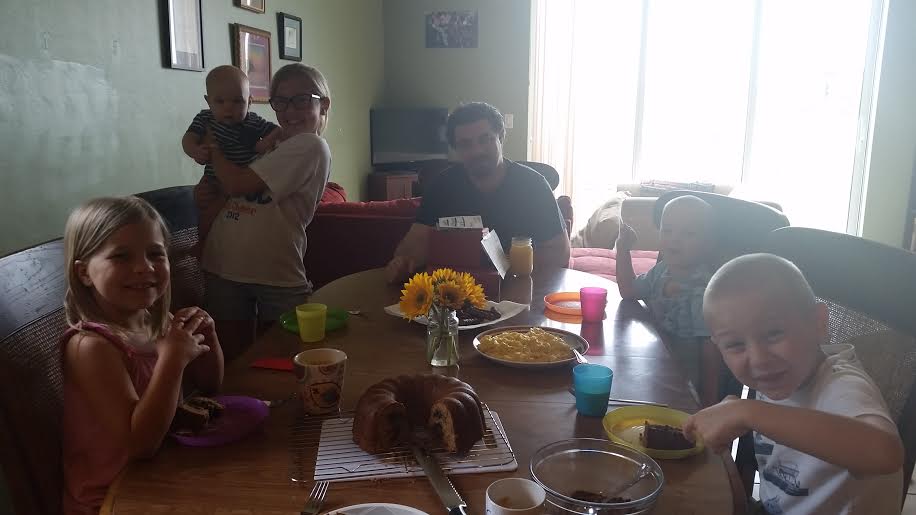I’m going to write about an issue that I have really been grappling with during this pregnancy. I really wanted to write a few lighter, funnier posts on this blog first to ease my readers into a false sense of comfort before I hit you with the big, lightning-rod issues, but after spending a few days trying to think of something funny to tell you I gave up. And honestly, it’s probably better that you figure out what I’m all about before you get attached to this blog and then offended. (Is it arrogant of me to assume that any of you will get attached to this blog?)
Here’s a little bit of background for those of you who don’t know me: I was raised Protestant (of the non-denominational, Baptisty-ey flavor) and converted to Catholicism after attending the University of Dallas. I like to blame my conversion on intellectual prowess, because UD has a great core curriculum that immerses its’ students in the Western tradition, and I believe that a truly thoughtful person cannot go through that program without being at least influenced by the philosophical truth of Catholic teaching. However, the sad truth is that in college I was less a thinking person and more a typical college student. Much of my conversion was brought about through truly poor life choices and the consequences that followed. I’m not going to go into all that here, maybe another time, but the act of going to Mass became a solace in those dark days, and the light of the Christ and His Church, in conjunction with the love and support of my family, friends, and now-husband, were all that brought me through that time.
However, the first time I was told that Catholics weren’t supposed to use contraception, I was horrified. That alone nearly derailed my conversion. I thought that was the most idiotic, backward, oppressive-to-women thing I had ever heard. (Did I mention that I have a latent feminist streak? I’m battling it, trust me.)
After many, many, many conversations with priests, women, friends, in-laws, and others whose wisdom exceeds my own, I managed to grudgingly admit the truth of the intellectual argument, which I see as two-fold. The first part is this: sex within marriage is an act that is meant to be both unitive and procreative. To use artificial means to deny one part of that act is to undercut the fullness of grace inherent in the act. This is not to say that every time a Catholic couple has sex they should be trying to have a baby; in fact, NFP (Natural Family Planning) is commonly used by Catholic couples to determine fertility in the woman, and sometimes couples for various reasons choose to abstain from sex during those times. But abstaining from sex is not the same thing as using contraception. Contraception falsely separates the life-creating power of the sexual act from the act itself. Abstaining recognizes the potential for new life and respects the dignity of the sexual act by acknowledging that power. In a way, NFP also allows couples to respect each other more fully as well. It allows them to say, “I respect and love you too much to use you for my own pleasure, or to use this powerful act solely as a tool for our mutual pleasure.”
The second part of the intellectual argument is that many contraceptives are abortive in nature; that is, the Pill and IUD’s often do not prevent the sperm from implanting into the egg, but instead prevent the fertilized egg from implanting into the uterus. To some people, even pro-life people, this may seem like splitting philosophical hairs, but I don’t see it that way. Respect for life, in my opinion, is respect for life. In most cases a fertilized egg will, in 9 months, result in a living baby; therefore, chemically disposing of the egg is abortive in nature.
I say that I intellectually agreed with these positions because, to be frank, I was pretty pissed off about the whole thing. The first part of the argument, the “unitive and procreative” thing, I understood but didn’t really care much about. I knew plenty of Protestant couples who had used birth control and had fine, even wonderful, marriages. I didn’t really believe that it would have that big of an impact. The second part was the part that got me; I am and always have been staunchly and vocally pro-life. I think the killing of infants is the most horrific development of our modern age and is wreaking destruction on the souls and minds of us all. Obviously, I couldn’t take the Pill if there was even the slightest chance that I might be culpable for killing my own child.
All this wasn’t that big of a concern for me at first. We had Sienna in 2005, and then Charlotte in 2008. That seemed to me a reasonable spread, and I figured that we’d wait at least four or five years for another one. Then we discovered that I was pregnant when Charlotte was only ten months old.
This was nothing short of calamitous to me. It wasn’t so much that three children seemed like such a nightmare; it was that suddenly I felt that I couldn’t trust NFP, and I saw my future laid out in front of my feet, and it was a future that involved –because I’m only 26!– at least twelve children. I had never really considered the possibility of children occurring so soon after one another, but once they did, I realized just how many child-bearing years I have left. I was –and am– terrified.
See, I always swore that I would never have children. I’m not one of those people that rushes up to babies in supermarkets; actually, I always found children strange, annoying and dirty until I had my own. (That opinion hasn’t changed a lot, but I’ve discovered that I love the little dirtballs.) I felt that my vocation lay elsewhere; I wanted to be a writer, and have had it on good authority that I have some potential in that area. Additionally, we’re poor. I mean really, really, living-on-the-stipend-of-a-graduate-assistant poor. For those of you outside academia, this means that going to a movie or eating fast food are luxuries we can afford to indulge in twice a year at most. This also means that we can’t afford private school, and since neither my husband nor I would ever consider putting our children through that atrocity that the government calls education, our only option left is homeschooling. That sent my panic level right through the roof. Not only did I just not want to be responsible for figuring out how to shove age-appropriate knowledge into little brains in age-appropriate ways, but my opinion of homeschoolers had always been similar to this.
Slowly, over the course of the first six months of my pregnancy, my panic turned into real anger. I became furious with the Catholic Church for sentencing me to a life of bearing and rearing children while my husband got to pursue his passion — teaching and literature — while being a father, simply because he’s a man. And when my latent feminist reared her ugly head, things got really interesting. I started to fume about those men in Rome who make these rules without caring about the life of absolute drudgery that they are condemning women the world over to…and how dare they. All my intellectual agreement with the Church’s arguments went right out the window.
So I began talking with my friends about the whole situation. Consciously, I told myself that I was just trying to “understand the position of the Church.” But subconsciously, I had already decided to use birth control after this baby was born, and I was looking for as many Catholics as possible to tell me that it was okay, given my particular circumstances.
As further evidence that God is at work in all things, I didn’t find many. What I did find were friends who genuinely love me enough to remind me just why the Church teaches what it does. The woman who had the biggest impact on me is a dear friend who also was hugely influential in my conversion, and she reminded me that the Church doesn’t say to us, “Don’t do this or you’ll go to hell.” Rather, the Church says, “Oh please, please don’t choose to do that. We love you and care about your spiritual well-being enough to beg you not to make a choice that will be so detrimental to you and your family.” She also steered me to an amazing website with this article, which completely revolutionized my thinking about birth control.
The article points out that contraception disconnects the act of sex from the power of creating life. This is part of that “unitive and procreative” argument. But what she details, and what I had never considered, is the damage this separation is causing to our society. I’m not going to summarize the article (because I really want you to go read it!), but the conclusion I drew from it is that aside from the damage contraception does to a woman’s own body, it also does subversive and terrible damage to a marriage, a family, and our society as a whole. And my wishes to have an easy fix, a sure guarantee that our children would come on our schedule, would only lead me to take part in that damage.
However, it wasn’t until I finally gave in and began doing what most people would start out doing that I got any sort of clear answer or direction from God. I really, really hadn’t wanted to pray about this situation, because I knew I was wrong and I also knew the answer I got wouldn’t be the one I wanted. But once I did, I was reminded of the gentle and loving nature of God. Instead of crushing me with guilt for even considering using contraception, I found myself experiencing a renewed gratitude for my children and a renewed love for my vocation of wife and mother. Instead of waking up grumpy, annoyed that my children had once again started my day for me at 5:45 am, I kept inexplicably smiling and giggling, even while bleary-eyed, at the sight of their matted hair and bobbing little heads running down the hallway. Every word they spoke and every hug they gave me and even every fight they had became a little more precious. This renewal of love and gratitude for my children allowed me to remember one of the fundamental truths that the Church, in its teachings on contraception, is trying to protect: children are a gift. They are a blessing, a miracle, and an occasion for grace with every little tantrum.
I’m sure this new-found peace won’t last forever, but I’m grateful for it right now. And in the meantime, after the baby boy is born, I’ll go back to struggling with NFP and trusting that God’s plan for my life is much better than mine. He hasn’t let me down yet.










